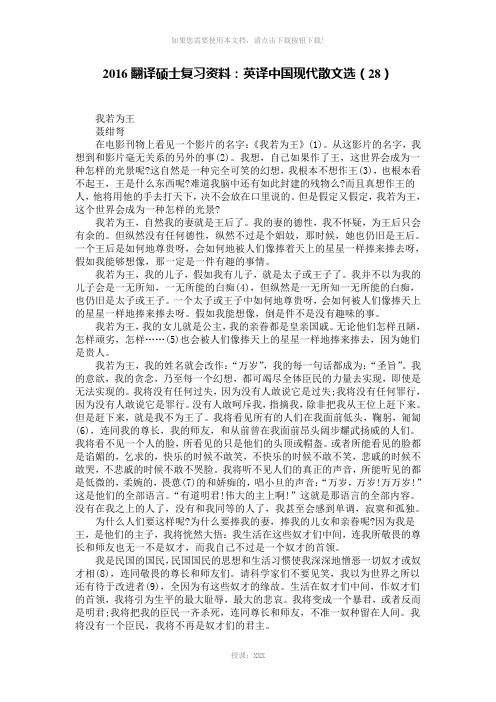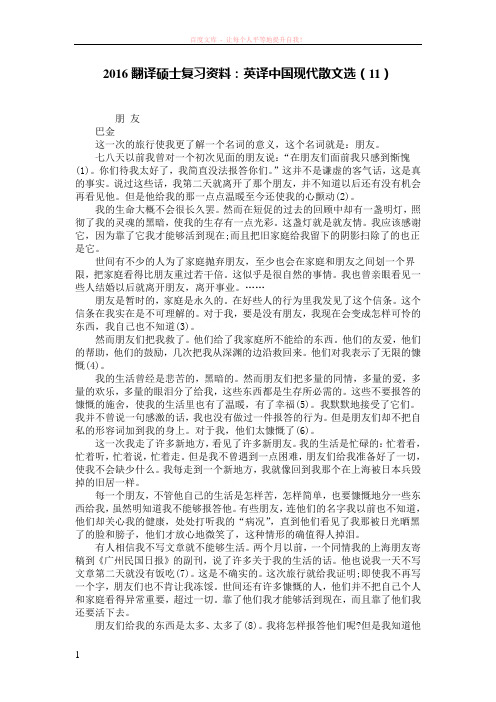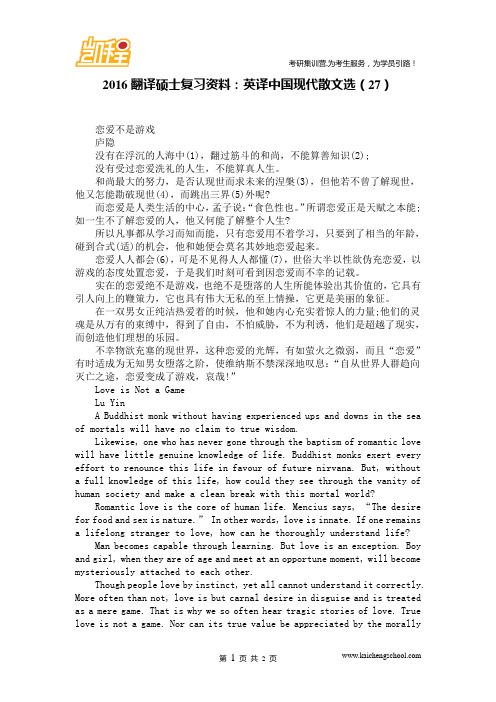翻译硕士复习英译中国现代散文
2016翻译硕士复习资料:英译中国现代散文选(28)

2016翻译硕士复习资料:英译中国现代散文选(28)我若为王聂绀弩在电影刊物上看见一个影片的名字:《我若为王》(1)。
从这影片的名字,我想到和影片毫无关系的另外的事(2)。
我想,自己如果作了王,这世界会成为一种怎样的光景呢?这自然是一种完全可笑的幻想,我根本不想作王(3),也根本看不起王,王是什么东西呢?难道我脑中还有如此封建的残物么?而且真想作王的人,他将用他的手去打天下,决不会放在口里说的。
但是假定又假定,我若为王,这个世界会成为一种怎样的光景?我若为王,自然我的妻就是王后了。
我的妻的德性,我不怀疑,为王后只会有余的。
但纵然没有任何德性,纵然不过是个娼妓,那时候,她也仍旧是王后。
一个王后是如何地尊贵呀,会如何地被人们像捧着天上的星星一样捧来捧去呀,假如我能够想像,那一定是一件有趣的事情。
我若为王,我的儿子,假如我有儿子,就是太子或王子了。
我并不以为我的儿子会是一无所知,一无所能的白痴(4),但纵然是一无所知一无所能的白痴,也仍旧是太子或王子。
一个太子或王子中如何地尊贵呀,会如何被人们像捧天上的星星一样地捧来捧去呀。
假如我能想像,倒是件不是没有趣味的事。
我若为王,我的女儿就是公主,我的亲眷都是皇亲国戚。
无论他们怎样丑陋,怎样顽劣,怎样……(5)也会被人们像捧天上的星星一样地捧来捧去,因为她们是贵人。
我若为王,我的姓名就会改作:“万岁”,我的每一句话都成为:“圣旨”。
我的意欲,我的贪念,乃至每一个幻想,都可竭尽全体臣民的力量去实现,即使是无法实现的。
我将没有任何过失,因为没有人敢说它是过失;我将没有任何罪行,因为没有人敢说它是罪行。
没有人敢呵斥我,指摘我,除非把我从王位上赶下来。
但是赶下来,就是我不为王了。
我将看见所有的人们在我面前低头,鞠躬,匍匐(6),连同我的尊长,我的师友,和从前曾在我面前昂头阔步耀武扬威的人们。
我将看不见一个人的脸,所看见的只是他们的头顶或帽盔。
或者所能看见的脸都是谄媚的,乞求的,快乐的时候不敢笑,不快乐的时候不敢不笑,悲戚的时候不敢哭,不悲戚的时候不敢不哭脸。
2016翻译硕士复习资料:英译中国现代散文选(11) (1)

2016翻译硕士复习资料:英译中国现代散文选(11)朋友巴金这一次的旅行使我更了解一个名词的意义,这个名词就是:朋友。
七八天以前我曾对一个初次见面的朋友说:“在朋友们面前我只感到惭愧(1)。
你们待我太好了,我简直没法报答你们。
”这并不是谦虚的客气话,这是真的事实。
说过这些话,我第二天就离开了那个朋友,并不知道以后还有没有机会再看见他。
但是他给我的那一点点温暖至今还使我的心颤动(2)。
我的生命大概不会很长久罢。
然而在短促的过去的回顾中却有一盏明灯,照彻了我的灵魂的黑暗,使我的生存有一点光彩。
这盏灯就是就友情。
我应该感谢它,因为靠了它我才能够活到现在;而且把旧家庭给我留下的阴影扫除了的也正是它。
世间有不少的人为了家庭抛弃朋友,至少也会在家庭和朋友之间划一个界限,把家庭看得比朋友重过若干倍。
这似乎是很自然的事情。
我也曾亲眼看见一些人结婚以后就离开朋友,离开事业。
……朋友是暂时的,家庭是永久的。
在好些人的行为里我发见了这个信条。
这个信条在我实在是不可理解的。
对于我,要是没有朋友,我现在会变成怎样可怜的东西,我自己也不知道(3)。
然而朋友们把我救了。
他们给了我家庭所不能给的东西。
他们的友爱,他们的帮助,他们的鼓励,几次把我从深渊的边沿救回来。
他们对我表示了无限的慷慨(4)。
我的生活曾经是悲苦的,黑暗的。
然而朋友们把多量的同情,多量的爱,多量的欢乐,多量的眼泪分了给我,这些东西都是生存所必需的。
这些不要报答的慷慨的施舍,使我的生活里也有了温暖,有了幸福(5)。
我默默地接受了它们。
我并不曾说一句感激的话,我也没有做过一件报答的行为。
但是朋友们却不把自私的形容词加到我的身上。
对于我,他们太慷慨了(6)。
这一次我走了许多新地方,看见了许多新朋友。
我的生活是忙碌的:忙着看,忙着听,忙着说,忙着走。
但是我不曾遇到一点困难,朋友们给我准备好了一切,使我不会缺少什么。
我每走到一个新地方,我就像回到我那个在上海被日本兵毁掉的旧居一样。
2016翻译硕士复习资料:英译中国现代散文选(33)

2016翻译硕士复习资料:英译中国现代散文选(33)母亲的回忆朱德得到母亲去世的消息,我很悲痛。
我爱我母亲,特别是她勤劳一生,很多事情是值得我永远回忆的。
我家是佃农,祖籍广东韶关籍人,在“湖广填四川” (1)时迁移四川仪陇县马鞍场。
世代为地主耕种,家境是贫苦的(2),和我们来往的朋友也都是老老实实的贫苦农民。
母亲一共生了十三个儿女,因为家境贫穷,无法全部养活,只留下八个,以后再生下的被迫溺死了。
这在母亲心里是多么悲痛、悲哀和无可奈何的事啊!母亲把八个孩子一手养大成人。
可是她的时间大半给家务和耕种占去了,没法多照顾孩子,只好让孩子们在地里爬着。
母亲是个“好劳动” (3)。
从我能记忆时起,总是天不亮就起床。
全家二十口人,妇女轮班煮饭,轮到就煮一年。
母亲把饭煮了,还要种田种菜,喂猪养蚕,纺棉花。
因为她身材高大结实,还能挑水挑粪。
母亲这样地整日劳碌着,我们到四五岁时就很自然地在旁边帮她的忙,到八九岁时就不单能挑能背,还会种地了。
记得那时我从学堂回家,母亲总在灶上汗流满面地烧饭,我就悄悄把书本一放,挑水或放牛去了。
有的季节里,我上午读书下午种地,一到农忙便整月停在地里跟着母亲劳动。
这个时期母亲教给我许多生产知识。
佃农家庭的生活自然是很苦的。
可是由于母亲的聪明能干,却很舒服。
我们把桐子榨油来点灯。
吃的是豌豆饭,菜花,红薯饭,杂粮饭,把菜籽榨出的油放在饭里做调料,这种地主富人家看也不看的饭食,母亲却能做得使一家吃起来有滋味。
赶上丰年,才能缝上一些新衣服,衣服也是自己生产出来的。
母亲亲手纺出线,请人织成布,染了颜色,我们叫做“家织布”,有铜钱那样厚,一套衣服老大穿过了,老二老三接下来穿还穿不烂(4)。
劳动的家庭是有规律有组织的。
我的祖父是一个中国标本式的农民,到了八九十岁还非耕田不可,不耕田就会害病,直到临死前不久还在地里劳动。
祖母是家庭的组织者,一切生产事务由她管理分派。
每年除夕,分派好一年的工作以后,天还没亮,母亲就第一个起床烧火做饭去了,接着听见祖父起来的声音,接着大家都离开床铺,喂猪的喂养猪,砍柴的砍柴,挑水的挑水。
2016翻译硕士复习资料:英译中国现代散文选(27)

2016翻译硕士复习资料:英译中国现代散文选(27)恋爱不是游戏庐隐没有在浮沉的人海中(1),翻过筋斗的和尚,不能算善知识(2);没有受过恋爱洗礼的人生,不能算真人生。
和尚最大的努力,是否认现世而求未来的涅槃(3),但他若不曾了解现世,他又怎能勘破现世(4),而跳出三界(5)外呢?而恋爱是人类生活的中心,孟子说:“食色性也。
”所谓恋爱正是天赋之本能;如一生不了解恋爱的人,他又何能了解整个人生?所以凡事都从学习而知而能,只有恋爱用不着学习,只要到了相当的年龄,碰到合式(适)的机会,他和她便会莫名其妙地恋爱起来。
恋爱人人都会(6),可是不见得人人都懂(7),世俗大半以性欲伪充恋爱,以游戏的态度处置恋爱,于是我们时刻可看到因恋爱而不幸的记载。
实在的恋爱绝不是游戏,也绝不是堕落的人生所能体验出其价值的,它具有引人向上的鞭策力,它也具有伟大无私的至上情操,它更是美丽的象征。
在一双男女正纯洁热爱着的时候,他和她内心充实着惊人的力量;他们的灵魂是从万有的束缚中,得到了自由,不怕威胁,不为利诱,他们是超越了现实,而创造他们理想的乐园。
不幸物欲充塞的现世界,这种恋爱的光辉,有如萤火之微弱,而且“恋爱”有时适成为无知男女堕落之阶,使维纳斯不禁深深地叹息:“自从世界人群趋向灭亡之途,恋爱变成了游戏,哀哉!”Love is Not a GameLu YinA Buddhist monk without having experienced ups and downs in the sea of mortals will have no claim to true wisdom.Likewise, one who has never gone through the baptism of romantic love will have little genuine knowledge of life. Buddhist monks exert every effort to renounce this life in favour of future nirvana. But, without a full knowledge of this life, how could they see through the vanity of human society and make a clean break with this mortal world?Romantic love is the core of human life. Mencius says, “The desire for food and sex is nature.” In other words, love is innate. If one remains a lifelong stranger to love, how can he thoroughly understand life?Man becomes capable through learning. But love is an exception. Boy and girl, when they are of age and meet at an opportune moment, will become mysteriously attached to each other.Though people love by instinct, yet all cannot understand it correctly. More often than not, love is but carnal desire in disguise and is treated as a mere game. That is why we so often hear tragic stories of love. True love is not a game. Nor can its true value be appreciated by the morallydegenerate.True love spurs one on to higher attainment. It embodies the supreme quality of selflessness, and is, above all, symbolic of beauty.When a man and woman are deeply immersed in true love, they are full of amazing inner strength. Their souls are freed from all bondage. They are unyielding before threats and incorruptible before any promise of material gain. They transcend the reality to create an ideal paradise of their own.Unfortunately, in this present world overflowing with material desires, this kind of true love is as rare as the feeble light of fireflies. What is more, “love” sometimes even leads to moral degeneration on the part of ignorant men and women. Over this, Venus cannot help lamenting with a deep sigh, “Love has become a mere game ever since humanity set out on its way to extinction. O what a sad story!”注释:女作家庐隐(1898-1934),福建闽侯人,早期与冰心齐名。
翻译硕士复习资料英译中国现代散文

翻译硕士复习资料英译中国现代散文时间即生命梁实秋 最令人怵目惊心的一件事,是看着钟表上的秒针一下一下的移动,每移动一下就是表示我们的寿命已经缩短了一部分。
再看看墙上挂着的可以一张张撕下的日历,每天撕下一张就是表示我们寿命又缩短了一天,因为时间即生命,没有人不爱惜他的生命,但很少人珍视他时间。
如果想在有生之年做一点什么事,学一点什么学问,充实自己,帮助别人,使生命成为有意义,不虚此生,那么就不可浪费光阴。
这道理人人都懂(1),可是很少人真能积极不懈的善为利用他的时间。
我自己就是浪费了很多时间的一个人(2)。
我不打麻将,我不经常的听戏看电影,几年中难得一次,我不长时间看电视,通常只看半个小时,我也不串门子闲聊天。
有人问我:“那么你大部分时间都做了些什么呢?”我痛自反省,我发现,除了职务上的必须及人情上所不能免的活动外,我的时间大部分都浪费了。
我应该集中精力,读我所未读过的书,我应该利用所有时间,写我所要写的东西。
但是我没能这样做。
我的好多时间都糊里糊涂的混过去了,“少壮不努力,老大徒伤悲。
” 例如我翻译莎士比亚,本来计划于课余之暇每年翻译两部,二十年即可完成,但是我用了三十年,主要的原因是懒。
翻译之所以完成,主要的是因为活得相当长久,十分惊险(3)。
翻译完成之后,虽然仍有工作计划,但体力渐衰,有力不从心之感(4)。
假使年轻的时候鞭策自己,如今当有较好或较多的表现。
然而悔之晚矣。
再例如,作为一个中国人,经书不可不读。
我年三十才知道读书自修的重要(5)。
我披阅,我圈点。
但是恒心不足,时作时辍。
五十以学易,可以无大过矣(6),我如今年过八十,还没有接触过《易经》,说来惭愧。
史书也很重要。
我出国留学的时候,我父亲买了一套同文石印的前四史(7),塞满了我的行箧的一半空间,我在外国混了几年之后又把前四史原封带回来了。
直到四十年后才鼓起勇气读了《通鉴》(8)一遍。
现在我要读的书太多,深感时间有限。
无论做什么事,健康的身体是基本条件。
2016翻译硕士复习资料:英译中国现代散文选(31)

2016翻译硕士复习资料:英译中国现代散文选(31)枣核萧乾动身访美之前,一位旧时同窗写来航空信,再三托付我为他带几棵生枣核(1)。
东西倒不占分量,可是用途却很蹊跷。
从费城出发前,我们就通了电话。
一下车,他已经在站上等了。
掐指一算,分手快半个世纪了,现在都已是风烛残年。
拥抱之后,他就殷切地问我:“带来了吗?”我赶快从手提包里掏出那几棵枣核(2)。
他托在掌心(3),像比珍珠玛瑙还贵重。
他当年那股调皮劲显然还没改。
我问起枣核的用途,他一面往衣兜里揣,一面故弄玄虚地说(4):“等会儿你就明白了。
”那真是座美丽的山城,汽车开去,一路坡上坡下满是一片嫣红。
倘若在中国,这里一定会有枫城之称。
过了几个山坳,他朝枫树丛中一座三层小楼指了指说:“喏,到了。
”汽车拐进草坪,离车库还有三四米,车库就像认识主人似的自动掀起。
朋友有点不好意思地解释说,买这座大房子时,孩子们还上着学,如今都成家立业了。
学生生物生物化学的老伴儿在一家研究所里做营养试验。
他把我安顿在二楼临湖的一个房间后,就领我去踏访他的后花园(5)。
地方不大,布置得却精致匀称(6)。
我们在靠篱笆的一张白色长凳上坐下,他劈头就问我:“觉不觉得这花园有点家乡味道?”经他指点,我留意到台阶两旁是他手栽的两株垂杨柳,草坪中央有个睡莲池。
他感慨良深地对我说:“栽垂柳的时候,我那个小子才五岁,如今在一条核潜艇上当总机械长了。
姑娘在哈佛教书。
家庭和事业都如意,各种新式设备也都有了。
可是我心上总像是缺点什么。
也许是没出息(7),怎么年纪越大,思乡越切。
我现在可充分体会出游子的心境了。
我想厂甸,想隆福寺。
这里一过圣诞,我就想旧历年。
近来,我老是想总布胡同院里那棵枣树。
所以才托你带几棵种籽,试种一下。
”接着,他又指着花园一角堆起的一座假山假山石说(8):“你相信吗(9)?那是我开车到几十里以外,一块块亲手挑选,论公斤买下(10),然后用汽车拉回来的。
那是我们家的‘北海’。
”说到这里,我们两人都不约而同地站了起来。
翻硕英译中国现代散文选

翻硕英译中国现代散文选落花生 我们屋后有半亩隙地。
母亲说:“让它荒芜着怪可惜,既然你们那么爱吃花生,就辟来做花生园罢(1)。
”我们几个姊弟(2)和几个小丫头都很喜欢——买种的买种,动土的动土,灌园的灌园;过了不几个月,居然收获了! 妈妈说:“今晚我们可以做一个收获节(3),也请你们的爹爹来尝尝我们底新花生,如何?”我们都答应了。
母亲把花生做成好几样食品(4),还吩咐这节期要在园里底茅亭举行。
那晚上底天色不大好(5),可是爹爹也来到,实在很难得!爹爹说:“你们爱吃花生吗?” 我们都争着答应:“爱!” “谁能把花生底好处说出来?” 姊姊说:“花生的气味很美。
” 哥哥说:“花生可以榨油。
” 我说:“无论何等人都可以用贱价买它来吃;都喜欢吃它。
这是它的好处。
” 爹爹说:“花生底用处固然很多;但有一样是很可贵的。
这小小的豆(6)不像那好看的苹果、桃子、石榴,把它们底果实悬在枝上,鲜红嫩绿的颜色(7),令人一望而发生羡慕的心。
它只把果子埋在地底,等到成熟,才容人把它挖出来。
你们偶然看见一棵花生瑟缩(8)地长在地上,不能立刻辨出它有没有果实,非得等到你接触它才能知道。
” 我们都说:“是的。
”母亲也点点头。
爹爹接下去说:“所以你们要像花生(9),因为它是有用的,不是伟大、好看的东西。
”我说:“那么,人要做有用的,不要做伟大、体面的人了。
”爹爹说:“这是我对于你们的希望。
” 我们谈到夜阑才散,所有花生食品虽然没有了,然而父亲底话现在还印在我心版上。
PeanutsXu Dishan Behind our house there lay half a mou of vacant land. Mother said, “it’s a pity to let it lie waste. Since you all like to eat peanuts so very much, why not plant some here?” that exhilarated us children and our servant girls as well, and soon we started buying seeds, ploughing the land and watering the plants. We gathered in a good harvest just after a couple of months! Mother said, “How about giving a party this evening to celebrate the harvest and inviting your Daddy to have a taste of our newly-harvested peanuts?” We all agreed. Mother made quite a few varieties of goodies out of the peanuts, and told us that the party would be held in the thatched pavilion on the peanut plot. It looked like rain that evening, yet, to our great joy, father came nevertheless. “Do you like peanuts?” asked father. “Yes, we do!” we vied in giving the answer. “Which of you could name the good things in peanuts?” “Peanuts taste good,” said my elder sister. “Peanuts produce edible oil,” said my elder brother. “Peanuts are so cheap,” said I, “that anyone can afford to eat them. Peanuts are everyone’s favourite. That’s why we call peanuts good.” “It’s true that peanuts have many uses,” said father, “but they’re most beloved in one respect. Unlike nice-looking apples, peaches and pomegranates, which hang their fruit on branches and win people’s admiration with their brilliant colours, tiny little peanuts bury themselves underground and remain unearthed until they’re ripe. When you come upon a peanut plant lying curled up on the ground, you can never immediately tell whether or not it bear any nuts until you touch them.” “That’s true,” we said in unison. Mother also nodded. “So you must take after peanuts,” father continued, “because they’re useful though not great and nice- looking.” “Then you mean one should be useful rather than great andnice-looking,” I said. “That’s what I expect of you,” father concluded. We kept chatting until the party broke up late at night. Today, though nothing is left of the goodies made of peanuts, father’s words remain engraved in my mind. 注释: 本文是许地山(1892-1941)的名篇。
19翻译硕士复习资料:英译汉散文(1)

2019翻译硕士复习资料:英译汉散文(1)在MTI的命题考试中,有的院校偏爱政治时事类的,而有的学校则是偏爱于名著散文类的,所以对于不同的院校,在复习的时候侧重点也是不一样的,凯程陈老师给大家准备了一篇散文的中英双语,供大家备考使用。
艰难的国运与雄健的国民历史的道路,不会是坦平的,有时走到艰难险阻的境界。
这是全靠雄健的精神才能冲过去的(1)。
一条浩浩荡荡的长江大河,有时流到很宽阔的境界(2),平原无际,一泻万里(3)。
有时流到很逼狭的境界,两岸丛山迭岭,绝壁断崖,江河流于期间,回环曲折,极其险峻(4)。
民族生命的进展,其经历亦复如是。
人类在历史上的生活正如旅行一样。
旅途上的征人(5)所经过的地方,有时是坦荡平原,有时是崎岖险路(6)。
志于旅途的人,走到平坦的地方,因是高高兴兴地向前走,走到崎岖的境界,俞是奇趣横生(7),觉得在此奇绝壮绝(8)的境界,俞能感到一种冒险的美趣(9)。
中华民族现在所逢的史路,是一段崎岖险阻的道路。
在这段道路上,实在亦有一种奇绝壮绝的境至,使我们经过此段道路的人,感得一种壮美的趣味,是非有雄健的精神的,不能够感觉到的。
我们的扬子江、黄河,可以代表我们的民族精神,扬子江及黄河遇见沙漠、遇见山峡都是浩浩荡荡的往前流过去,以成其浊流滚滚,一泻万里的魄势(10)。
目前的艰难境界,那能阻抑我们民族生命的前进。
我们应该拿出雄健的精神,高唱着进行的曲调,在这悲壮歌声中,走过这崎岖险阻的道路。
要知(11)在艰难的国运中建造国家,亦是人生最有趣味的事……。
National Crisis vs Heroic NationThe course of history is never smooth.It is sometimes beset with difficulties and obstacles and nothing short of a heroic spirit can help surmount them.A mighty long river sometimes flows through a broad section with plains lying boundless on either side,its waters rolling on non-stop for thousands upon thousands of miles.Sometimes it comes up against a narrow section flanked by high mountains and steep cliffs,winding through a course with many a perilous twist and turn.A nation,in the course of its development,fares likewise.The historical course of man’s life is just like a journey.A traveler on a long journey passes through now a broad,level plain,now a rugged, hazardous road.While a determined traveler cheerfully continues his journey upon reaching a safe and smooth place,he finds it still more fascinating to come to a rugged place,the enormously magnificent spectacle of which,he feels,is better able to generate in him a wonderful sensation of adventure.The Chinese nation is now confronted with a rugged and dangerous section of its historical course.Nevertheless,there is also in this section a spectacle of enormous magnificence that inspires in uspassers-by a delightful sensation of splendor.And this delightful sensation,however,can only be shared by those with a heroic spirit.The Yangtse River and the Yellow River are both symbolic of our national spirit the two mighty rivers negotiate deserts and gorges until their turbid torrents surge forward with irresistible force.The present national crisis can never obstruct the advance of our national life.Let us brace up our spirits and march through this rugged,dangerous road to the tune of our solemn,stirring songs.The greatest joy of life,mind you,is to build up our country during its most difficult days.注释:李大钊此文载于1923年12月20日《新国民》第一卷第2号上,短小隽永,堪称一首诗意盎然的抒情散文诗。
- 1、下载文档前请自行甄别文档内容的完整性,平台不提供额外的编辑、内容补充、找答案等附加服务。
- 2、"仅部分预览"的文档,不可在线预览部分如存在完整性等问题,可反馈申请退款(可完整预览的文档不适用该条件!)。
- 3、如文档侵犯您的权益,请联系客服反馈,我们会尽快为您处理(人工客服工作时间:9:00-18:30)。
翻译硕士复习英译中国现代散文许多院校在考试的试卷上都喜欢出一些中国比较经典的现在范文片段,然后让学生进行汉译英的翻译,所以凯程老师整理了经典的现代散文翻译供大家参考,同时在文章后面对于个别字词进行了解析,帮助同学们弄懂文章的意思。
野草夏衍 有这样一个故事。
有人问:世界上什么东西的气力最大(1)?回答纷纭的很,有的说“象”,有的说“狮”,有人开玩笑似的说:是“金刚”,金刚(2)有多少气力,当然大家全不知道。
结果,这一切答案完全不对(3),世界上气力最大的,是植物的种子。
一粒种子所可以显现出来的力,简直是超越一切,这儿又是一个故事。
人的头盖骨,结合得非常致密与坚固,生理学家和解剖学者用尽了一切的方法,要把它完整在分出来(4),都没有这种力气,后来忽然有人发明了一个方法,就是把植物的种子放在要解剖的头盖骨里,给它以温度与湿度,使它发芽(5),一发芽,这些种子便以可怕的力量,将一切机械力所不能分开的骨骼,完整地分开了。
植物种子力量之大,如此如此。
这,也许特殊了一点,常人不容易理解,那么,你看见笋的成长吗?你看见被压在瓦砾和石块下面的一颗小草的生成吗?它为着向往阳光,为着达成它的生之意志(6),不管上面的石块如何重,石块与石块之间如何狭,它必定要曲曲折折地,但是顽强不屈在透到地面上来,它的根往土壤里钻,它的芽往地面挺,这是一种不可抗拒的力,阻止它的石块,结果也被它掀翻,一粒种子的力量的大,如此如此。
没有一个人将小草叫做“大力士” (7),但是它的力量之大,的确是世界无比,这种力,是一般人看不见的生命力,只要生命存在,这种力就要显现,上面的石块,丝毫不足以阻挡,因为它是一种“长期抗战”的力,有弹性,能屈能伸的力,有韧性,不达目的不止的力(8)。
种子不落在肥土而落在瓦砾中,有生命力的种子决不会悲观和叹气,因为有阻力才有磨炼。
生命开始的一瞬间就带了斗争来的草,才是坚韧的草,也只有这种草,才可以傲然地对那些玻璃棚中养育着的盆花哄笑。
Wild GrassXia Yan There is a story which goes like this: Someone asked, “What has the greatest strength on earth?” The answers varied. Some said, “The elephant.” Some said, “The lion.” Some said jokingly, “The fierce-browed guardian gods to Buddha.” But nobody of course could tell how strong the guardian gods were supposed to be. All the answers turned out to be wide of the mark. The mightiest thing on earth is the seed of a plant. The great strength which a seed is capable of is simply matchless. Here goes another story: The bones forming a human skull are so tightly and perfectly fit together that all physiologists or anatomists, hard as they try, arepowerless to take them apart without damaging them. It so happened that, at the suggestion of someone, some seeds of plant were placed inside a human skull awaiting dissection before heat and moisture were applied to cause them to grow. Once they started to grow, they let loose a terrific force to separate all the skull bones, leaving each of them intact. This would have been impossible with any mechanical power under the sun. See, how powerful the seeds of a plant can be! This story may be somewhat too unusual for you to understand. Well, have you ever seen the growth of a bamboo shoot? Or the growth of tender grass from under a heap of rubble or rocks? Seeking sunlight and survival, the young plant will labour tenaciously through twists and turns to bring itself to the surface of the ground no matter how heavy the rocks overhead may be or how narrow the opening between them. While striking its roots deep into the soil, the young plant pushes its new shoots above-ground. The irresistible strength it can muster is such as to overturn any rock in its way. See, how powerful a seed can be! Though nobody describes the little grass as a “husky”, yet its herculean strength is unrivalled. It is the force of life invisible to the naked eye. It will display itself so long as there is life. The rock is utterly helpless before this force—a force that will forever remain militant, a force that is resilient and can take temporary setbacks calmly, a force that is tenacity itself and will never give up until the goal is reached. When a seed falls under debris instead of on fertile soil, it never sighs in despair because to meet with obstruction means to temper itself. Indomitable is the grass that begins its very life with a tough struggle. It is only fit and proper that the proud grass should be jeering at the potted flowers in a glass house. 注释:《野草》是夏衍(1900-1995)于抗战期间写的一篇散文,赞颂小草的那种为常人看不见的顽强生命力,以象征手法鼓舞国人坚定抗战胜利的信心。
(1)“世界上什么东西的气力最大”译为What has the greatest strength on earth,其中on earth和in the world同义,但此句用on earth较为合适,因它通常用于疑问词或最高级词后加强语气。
(2)“金刚”是“金刚力士”之略,指守护佛法的天神,常怒目作勇猛之相,现把它意译为the fierce-browed guardian gods to Buddha,其中fierce-browed的意思是“怒目横眉”。
(3)“结果,这一切答案完全不对”译为All the answers turned out to be wide of the mark,其中wide of the mark或far from the mark为成语,意即“离谱”、“不正确”。
(4)“把它完整地分出来”即“把它完好无损地分开”,故译为to take them apart without damaging them。
(5)“使它发芽”的译文为to cause them grow。
也可译为to cause them to put out fresh shoots。
(6)“为着向往阳光,为着达成它的生之意志”实际上的意思是“为了争取阳光和生存”,故译为Seeking sunlight and survival即可。
(7)“没有一个人将小草叫做‘大力士’”译为Though nobody describes the little grass as a “husky”,其中describe…as的意思是“把……说成”、“把……称为”;husky的意思是“高大强壮的人”。
(8)“有韧性,不达目的不止的力”译为a force that is tenacity itself and will never give up until the goal is reached,其中itself一词用来加强前面的抽象名词tenacity,属习惯用法。
